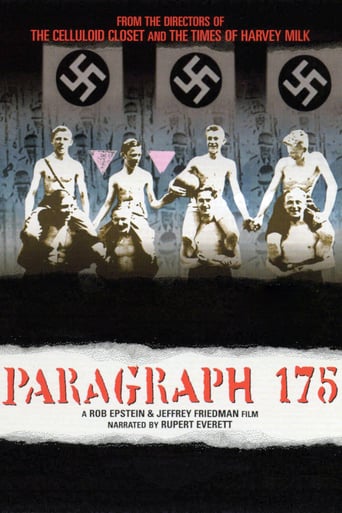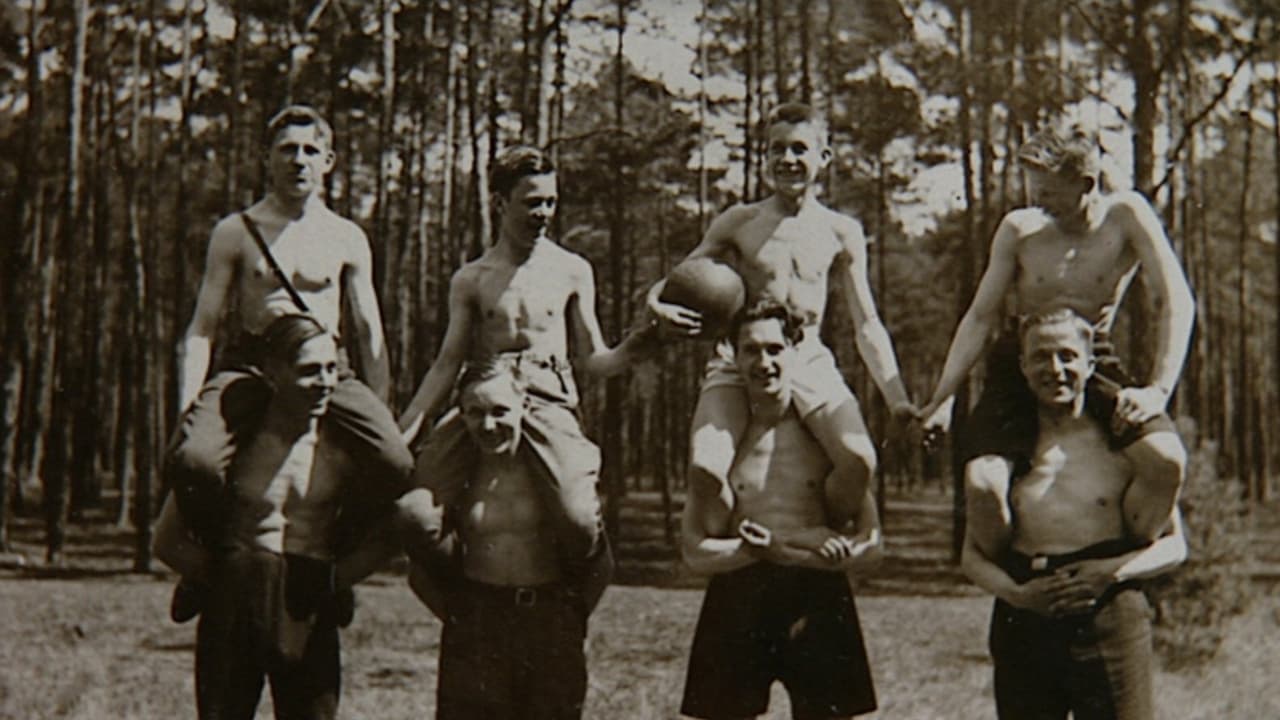Grant Malkin
This one made me cry, you can see the pain in their eyes when they are telling you of what happened to them.I would HIGHLY recommend this to ANYONE to watch. If nothing else but to understand..5 out of about 100,000 survived and I am sure (unfortunately) that there are less today, this gives us an insight as to the hell these men faced for being themselves.Historian Klaus Müller has opened my eyes as to what was done during WW2, given us a piece of history not to forget.10 out of 10 from me!!
gftbiloxi
The German Penal Code of 1871, Paragraph 175, states "An unnatural sex act committed between persons of the male sex or by humans with animals is punishable by imprisonment; the loss of civil rights may also be imposed." The law was widely disregarded, and the post-World War I Weimar Republic saw a flowering of gay and lesbian culture, most particularly in Berlin. When the Weimar Republic collapsed and the Nazi party rose to power, few gays and lesbians felt any reason to fear: was not Ernst Rohm, head of the SA, well known for his homosexuality? On 1 July 1934, later known as "The Night of Long Knives," the Nazi party conducted a bloody purge of their ranks. Rohm was among the victims, and as the Nazis swept to full power over Germany they moved to broaden the scope of Paragraph 175. The glory days of gay and lesbian Berlin were over. Somewhat oddly, lesbians were not regarded as a threat to the Nazi party, and many lesbians either left Germany or simply withdrew from public life, thus escaping with their lives. Gay men, however, came under full attack. A special branch of the Gestapo was formed to identify gay men; once their lists were established the arrests began.With many records destroyed by the Nazis as the Allies swept through Europe at the close of the war, it is now very difficult to estimate how many homosexuals were arrested. Most historians agree there is hard evidence to support a figure of 100,000, but many note that the total may have been well in excess of that, possibly to the extent of 600,000 total. Of those fed into the Nazi meat grinder, perhaps 4,000 survived--a much lower survival rate than that found even among political prisoners. There is considerable evidence that homosexuals were regarded as the "lowest of the low" in the prison pecking order and suffered not only from Nazi atrocity but were also sometimes savaged by their fellow prisoners as well. And to them was given a final curse: the victorious Allies retained Paragraph 175 as law following the collapse of Nazi Germany. Fearing possible re-arrest at Allied hands, homosexuals who survived the prisons and concentration camps dare not speak of their lives and experiences. Most would remain silent until their deaths.The documentary PARAGRAPH 175 does not attempt to examine the full scope of Nazi atrocity or even Nazi atrocity against the gay community. It instead focuses on the memories of a handful of men and women who recall their experiences. Perhaps the single most famous of these is Pierre Seel, who saw his lover killed by dogs in the death camps and who closeted himself to a remarkable extent after the war. "I am ashamed!" Seel cries at one point in his series of interviews. "I am ashamed for humanity!" It is a memorable moment of pain echoing across the decades. Seel died in 2005.While most of the interview subjects are male, lesbians are represented by Annette Eick, a remarkably charming woman, and while their stories vary considerably in detail they are the same in content: I was there, I saw it, and I bear witness for those who cannot speak. At times the film seems excessively languid, but overall it does justice to its interview subjects, who emerge as fully-depicted individuals, sometimes passionate, sometimes restrained, but never without the dignity that should belong to all mankind as birthright.The DVD contains several extras. Although it contained several points of interest I was not greatly impressed with the audio commentary; on the other hand, I was greatly impressed with two bonus interviews and particularly so by subject Kitty Fisher, a Jewish woman who recounts how a homosexual prisoner came to her aid--and whose advice ultimately saved her life.These are painful memories, all of them, and all the more so because the Holocaust has been increasingly downplayed over the past few decades--downplayed to a point at which some few now attempt to deny that it ever occurred at all. But facts remain facts no matter how many misguided people attempt to change or refute them, and in the name of humanity itself we owe all those who have suffered in the killing fields of the world the dignity of truth. PARAGRAPH 175 is a part of that truth.GFT, Amazon Reviewer
pyotr-3
The concentration camp survivors interviewed in this documentary broke my heart... hearing the man who saw his best friend eaten by German Shepards... and the gay man who courageously freed his Jewish lover, only to see his lover act even more courageously by choosing to return to his sick family, to die together with them. These stories are real, they are devastating, and they MUST be seen by everyone.
Gonzalo Melendez (gonz30)
PARAGRAPH 175, which premiered in the US (outside of Sundance) last night at the Miami Gay and Lesbian Film Festival, is must-see viewing. When one thinks how many documentaries have been made about the Nazi oppression of Jews, Roma (formerly known as Gypsies), and other groups, it is almost inconceivable that it is only in the year 2000, 67 years after the Nazi persecution of male homosexuals started (in 1933), that a documentary on the subject is finally released. It was high time this happened. This documentary about the terrible fate of this population group aims to inform the general public, and does so well. It is aided by the excellent commentary voiced by openly gay actor and part-time Miami resident Rupert Everett. If it is shown anyplace near you, see it. It might be the only opportunity to do so, unless it is later distributed in video or DVD.


 AD
AD

